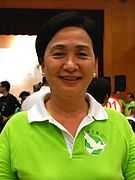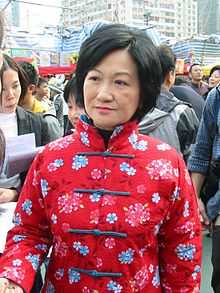Hong Kong legislative election, 2016
Hong Kong legislative election, 2016

|
|
|
|
|
|
The 2016 Hong Kong Legislative Council Election will be the election to the 6th Legislative Council of Hong Kong (LegCo). The electoral method of the election is currently being discussed under the 2014 Hong Kong electoral reform along with the 2017 Hong Kong Chief Executive election, which is supposed to be implemented by the method of universal suffrage.
Background
2016 Legislative Council and 2017 Chief Executive electoral reform
In December 2007, the National People's Congress Standing Committee (NPCSC) ruled out the possible universal suffrage in the 2012 LegCo Election but on the other hand states that the election of the LegCo may be implemented by the method of electing all members by universal suffrage after the Chief Executive is elected by universal suffrage which may be implemented in 2017,[1] which means that the 2016 LegCo Election will not be implemented by universal suffrage.
In December 2013, the Task Force on Constitutional Development headed by the Chief Secretary for Administration Carrie Lam, Secretary for Justice Rimsky Yuen, and Secretary for Constitutional and Mainland Affairs Raymond Tam published the Consultation Document on the Methods for Selecting the Chief Executive in 2017 and for Forming the Legislative Council in 2016, entitled "Let’s Talk and Achieve Universal Suffrage" which commenced a five-month public consultation period.[2] For the 2016 LegCo Election, the Consultation Document set out the questions such as the size of Legislative Council, the electorate base of the Functional Constituencies and also number of Geographical Constituencies and number of seats in each Geographical Constituency.
Umbrella Movement
On 31 August 2014, the NPCSC set limits for the 2016 Legislative Council and 2017 Chief Executive elections after Chief Executive Leung Chun-ying submitted the Consultation Report to the NPCSC in July 2014. While calling for "universal suffrage" for the 2017 Chief Executive election which two to three candidates would be nominated by a nominating committee with half of the members' support, the decision states that the process of forming the 2016 Legislative Council would be unchanged, but following the new process for the election of the Chief Executive, a new system to elect the Legislative Council via universal suffrage would be developed with the approval of Beijing.[3]
The pan-democrats vowed to veto this the proposal in which they saw as fake democracy. As a result of the decision, Occupy Central, a planned occupy movement to put pressure on Beijing to honour its promise said they would launch a mass-scale civil disobedience.[4] Also in response to the CPC decision, Hong Kong Federation of Students and the student pressure group Scholarism staged a co-ordinated class boycott in Hong Kong and organise public events, including street assemblies,[5][6] which led into a months-long large-scale occupy movement which is referred as the "Umbrella Revolution."
See also
References
External links
|
|---|
| | Main topics | | |
|---|
| | Related articles | |
|---|
| | Law and elections | |
|---|
|






